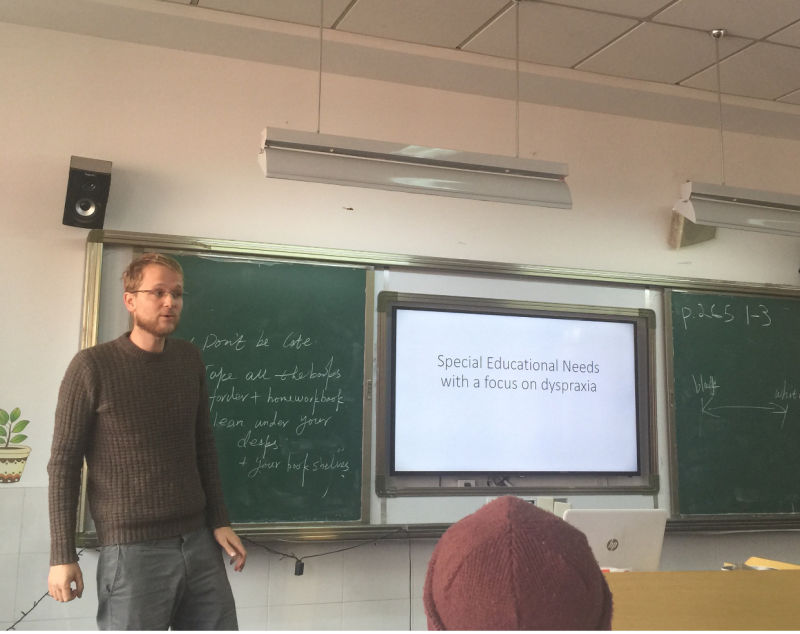【Special Educational Needs】他们比你更需要!
2016-12-14 Griff Pryce
你不知道,有些孩子真的好辛苦!
自闭症!
阅读障碍!
运动困难!
如恶魔般纠缠着他们幼小的心灵!

但是,你更不知道,西外初中双语国际课程部的外教Griff Pryce正在研究这方面的问题(这也是他的专业),为了帮助这些小孩找回自信,让笑脸在他们脸上重新洋溢!
冷嘲热讽的旧思维
最近,世界开始变得糟糕,差异不被认同和欣赏。用左手写字的小孩会被打;在拼写、书写和组织方面有困难的学生经常被贴上傻子的标签,并推向生活的边缘。
现在,有一个研究机构,旨在界定特殊教育需要,通过有针对性的教学,使我们能更好的理解学生的困难,并帮助他们克服困难。
随着人类的进步,我们正朝着对有精神困境和身体障碍的人“同样尊重”的方向发展。
观点
特殊教育越来越被需要

特殊教育需求
特殊教育需求(SEN)是和每一个教育机构相关且有趣的讨论话题。无论是社会的最底层成员,还是使我们迈向更大进步的天才,都有一部分人需要特殊教育的帮助。在西外,从能力最基本的学生到最优秀的学生,都有人在某些具体问题上需要额外的帮助,如运用障碍,阅读障碍,多动症和自闭症。如果这些问题不适时处理,可能会衍生其他问题甚至升级为更严重的问题。
在英国,专家可以一些方法来确定学生是否有特殊教育需求(SEN),他们需要怎样的帮助。2016年,英国有2.8%的学生被评估为至少表现出一项SEN。他们得到的额外帮助包括25%的额外考试时间、在课堂上使用笔记本电脑或有一个抄写员帮助他们在课堂上做笔记。在这份报告中,我将重点放在阅读障碍、运动障碍和自闭症上。我将讨论这些问题和一些我们可以帮助学生管理和克服这些困难的方法。

运用障碍症缺乏良好的运动技能、协调和组织能力
1笨拙但聪明
运用障碍患者经常被描述为“笨拙但聪明”。他们往往书写很慢,字迹难以辨认。但许多患者都培养出了优秀的听觉和口头表达的技能,以弥补他们在书写上的不足。我想起一个我们学校的学生,种种迹象表明他可能患有“运用障碍症”。他被分在程度较好的A班,对于课堂内容有较好的理解能力,经常参与课堂讨论。但他的书写却非常糟糕,导致他在课堂上的产出非常少。对于这样的学生,我们可以找出他们的问题,并为他们提供有针对性的教学。例如,指导他们如何在有横线的本子上或者白纸上把字写得均匀一些。如果他们的书写仍未得到改善,可以效仿英国的学生,使用电脑来做功课,这也是未尝不可的。
2缺乏组织能力
缺乏组织能力的“运用障碍症”患者可以受益于一些特定的课程训练,这些训练会教他们如何整理书籍,带老师指定的学习用品到学校,以及如何自主地安排学习。同时他们还需要提高协调能力。而对于年纪小的患者来说,最好的治疗方法是在玩乐中提高协调能力。如果方法使用得当,很多孩子可以走出“运用障碍症”的阴影。

3“运用障碍症”患者往往有特殊技能
“运用障碍症”患者往往在其他方面拥有令人惊讶的技能。一个案例研究描述了一个女患者,她过度饮食的、自尊心很低下、必须非常努力才能保住自己的工作。但是除此之外,她是一个非常优秀的长笛演奏家。这个鼓舞人心的案例表明,通过正确的训练,患者可以发展他们的技能,达到专业的水平。例如,患者们可以通过包括接球和抛球在内的玩乐方式来提高自信心、加强协调力。摄影也是任何一个SEN学生都可以用来更好地表达自我的方法。作为教师,我们可以鼓励患有该症的孩子发展他们的技能。
运动障碍的常见症状
运动技能差:笔记潦草、打字慢、乱食
生活问题: 失业、肥胖 、凌乱的个人生活
无组织性:健忘,冲动
特殊技能:说话和写作方面用词简洁。具有良好的处理词汇的技巧。在音乐、弓箭方面有惊人的天赋。
1阅读困难
 患有阅读障碍症会使得孩子非常沮丧。
患有阅读障碍症会使得孩子非常沮丧。
当一个孩子开始上学,并更多地专注于学习如何读和写的时候,阅读困难的迹象通常会变得明显。
患有阅读障碍的人可能:
-读写很慢
-混淆字母的顺序
-把字母的方向写错,如把“b”写成“d”
-拼写错误
-口头告知他们信息时,他们比较容易接受,但是对于书面信息却很难理解
-很难执行一系列的指令
-在计划和组织事物上有困难
1自闭症

自闭症是我要讨论的最后一个特殊的教育需求。患有严重自闭症的孩子会发现他们可能不能连贯的讲话或上主流的学校。然而,患有自闭症的学生进入主流学校还是很普遍的。这些学生有艾斯伯格综合症,共同的行为特征包括强迫症状、重复性和社交困难。在某些情况下,他们的强迫性可以加以利用。许多伟大的科学家和数学家都患有自闭症。比尔盖茨是一个自闭症患者,他也曾经是世界上最富有的人。然而,自闭症可能会给患者在社会生活中带来严重的挑战。他们会发现很难理解别人的意思、手势和面部表情。有时,他们可以受益于带指示性的缓慢而清晰的交谈。
SEN
特殊教育需求(SEN)提供了一个有用的框架,我们认识到我们的学生的需求,并采取系统的措施去帮助他们。大多数的英国学校现在常见的做法是设置一个特殊教育需求中心(SEN UNIT)。随着西外的发展,我认为设置一个特殊教育需求中心是有益处的。这是一个独立的部门,学生可以在除了常规的课程之外的时间参加这个中心的课程,让这些课程对常规课程学习有帮助。此部门也可用作学校的辅助部门。在这里,特殊教育专家们会帮助学生在一个安全的环境中建立自己的信心,并通过各种方式练习他们的技能。如果有特殊的需求,认知行为疗法(CBT)和辅导可以帮助学生处理任何程度较重的情感问题。一个特殊教育需求中心会使这些有此需求的孩子受益。
Special Educational Needs
Griff
Special Educational Needs (SEN) are a relevant and interesting topic for discussion in every educational institution. From the most downtrodden members of our society to the geniuses that light the path forwards towards our greater progress, there is a proportion of people with special educational needs. Within Xiwai, from the lowest set to the highest achievers, there are students who require extra help with specific problems. Problems like dyspraxia, dyslexia, ADHD and autism spectrum disorder. Sometimes these problems can escalate into greater and related problems if they are not dealt with at a young age. In the UK, a specialist can determine whether a student has a SEN and what help they will require. In 2016, 2.8% of students in the UK were ‘statemented’ with at least one form of SEN. Students are given extra help that can include 25% extra time in exams, using a laptop in class or they may be given a scribe to help them to take notes in class. In this report, I am going to focus on dyslexia, dyspraxia, and autism spectrum disorder. I am going to discuss these problems and some of the many ways that we can help students to manage and overcome these difficulties.
 Dyspraxia is a problem with fine motor skills, coordination and organisation. Dyspraxics are often described as ‘clumsy but clever’ though no two dyspraxics are entirely alike. Dyspraxics often write slowly and illegibly. Many develop excellent auditory and verbal skills in order to compensate for their poor handwriting. I can think of one student in particular in our school who show signs of being dyspraxic. He is in the A-stream and is very capable of understanding the class material and often participates in class discussions and teacher led expositions, but his handwriting is so bad that he produces little classwork and it is usually of a poor quality. We can help dyspraxics by identifying their problems and offering them targeted teaching. For example, by showing them how to writewithin the lines, or space their words evenly. If dyspraxics fail to improve their handwriting, it is not uncommon in the UK for students to do their classwork on a laptop.
Dyspraxia is a problem with fine motor skills, coordination and organisation. Dyspraxics are often described as ‘clumsy but clever’ though no two dyspraxics are entirely alike. Dyspraxics often write slowly and illegibly. Many develop excellent auditory and verbal skills in order to compensate for their poor handwriting. I can think of one student in particular in our school who show signs of being dyspraxic. He is in the A-stream and is very capable of understanding the class material and often participates in class discussions and teacher led expositions, but his handwriting is so bad that he produces little classwork and it is usually of a poor quality. We can help dyspraxics by identifying their problems and offering them targeted teaching. For example, by showing them how to writewithin the lines, or space their words evenly. If dyspraxics fail to improve their handwriting, it is not uncommon in the UK for students to do their classwork on a laptop.
Dyspraxics that struggle with organisation can benefit from study skills sessions that show them how to keep their books in order, bring the right equipment to class, and how to organise their independent study. Dyspraxics also need to improve their co-ordination and this is best done at a young age through play. With the right help many children can ‘grow out’ of dyspraxia. However, for adults who are still suffering from dyspraxia, there can be real problems. Half of all adult dyspraxics are unemployed. In the UK and other countries the government employs occupational therapists to help the chronically disorganised to get a handle on their lives and prepare them for employment.
 Dyspraxics can often be surprisingly skilled. One case study describes a woman who is a messy over eater, who suffers from low self-esteem, and struggles to hold down a job. Despite all this, she is an exceptionally talented flautist. This is inspiring as it shows that with the right training, dyspraxics can develop their manual skills to exceptional level. For example, dyspraxics can develop their confidence and co-ordination in many ways including throwing, catching and juggling. Photography is an excellent way for any SEN student to practice self-expression. As teachers we can encourage dyspraxics to develop their skills.
Dyspraxics can often be surprisingly skilled. One case study describes a woman who is a messy over eater, who suffers from low self-esteem, and struggles to hold down a job. Despite all this, she is an exceptionally talented flautist. This is inspiring as it shows that with the right training, dyspraxics can develop their manual skills to exceptional level. For example, dyspraxics can develop their confidence and co-ordination in many ways including throwing, catching and juggling. Photography is an excellent way for any SEN student to practice self-expression. As teachers we can encourage dyspraxics to develop their skills.
Dyslexia is a problem with spelling that can be extremely frustrating for a child.Signs of dyslexia usually become apparent when a child starts school and begins to focus more on learning how to read and write.
A person with dyslexia may:
-read and write very slowly
-confuse the order of letters in words
-put letters the wrong way round – such as writing "b" instead of "d"
-have poor or inconsistent spelling
-understand information when told verbally, but have difficulty with information that's written down
-find it hard to carry out a sequence of directions
-struggle with planning and organisation
 However, people with dyslexia often have good skills in other areas, such as creative thinking and problem solving. Dyslexics tend to favour sociable and interactive learning experiences. Whilst they struggle with spelling, they may still have strong skills in other areas. Steven Spielberg, Guy Ritchie and Whoopi Goldberg are famous dyslexics.
However, people with dyslexia often have good skills in other areas, such as creative thinking and problem solving. Dyslexics tend to favour sociable and interactive learning experiences. Whilst they struggle with spelling, they may still have strong skills in other areas. Steven Spielberg, Guy Ritchie and Whoopi Goldberg are famous dyslexics.
Autism Spectrum Disorder is the final Special Educational Need that I am going to discuss. Children with severe autism may find coherent speech impossible and they would not attend mainstream schools. However, it is quite common to find students who are on the autistic spectrum but are still able to attend mainstream schools. These functioning students are said to have Asperger’s. Common behavioural traits include obsessiveness, repetitiveness and social awkwardness. In some cases their obsessive nature can be harnessed and put to good use. Many great scientists and mathematicians are on the autistic spectrum. Bill Gates is an autistic and was once the world’s richest man. However, autism can present serious social challenges for sufferers. They can find it hard to recognise social cues, gestures, and facial expressions. Sometimes they can benefit from having instructions said to them slowly and clearly.
 Special Educational Needs (SEN)provides a useful framework for us to recognise the needs of our students and implement systems for helping them. It is now common practice in most UK schools to have an SEN unit and as Xiwai expands, I think it would benefit from the addition of an SEN unit. This is a separate unit that students may attend instead of regular classes, or in addition to regular classes, or they may simply use the unit as a base to help them navigate the school. The unit would be staffed by SEN specialists who would help students to build confidence in a safe environment and practice their skills in a plethora of ways. Cognitive Behavioural Therapy (CBT) and counselling can help students to deal with any significant emotional problems that may arise from having Special Educational Needs. An SEN unit would help students with SEN get the help and attention they need.
Special Educational Needs (SEN)provides a useful framework for us to recognise the needs of our students and implement systems for helping them. It is now common practice in most UK schools to have an SEN unit and as Xiwai expands, I think it would benefit from the addition of an SEN unit. This is a separate unit that students may attend instead of regular classes, or in addition to regular classes, or they may simply use the unit as a base to help them navigate the school. The unit would be staffed by SEN specialists who would help students to build confidence in a safe environment and practice their skills in a plethora of ways. Cognitive Behavioural Therapy (CBT) and counselling can help students to deal with any significant emotional problems that may arise from having Special Educational Needs. An SEN unit would help students with SEN get the help and attention they need.
教育,绝不放过任何一个问题,也决不放弃任何一个孩子!
![]()
(喜欢就点赞吧)

